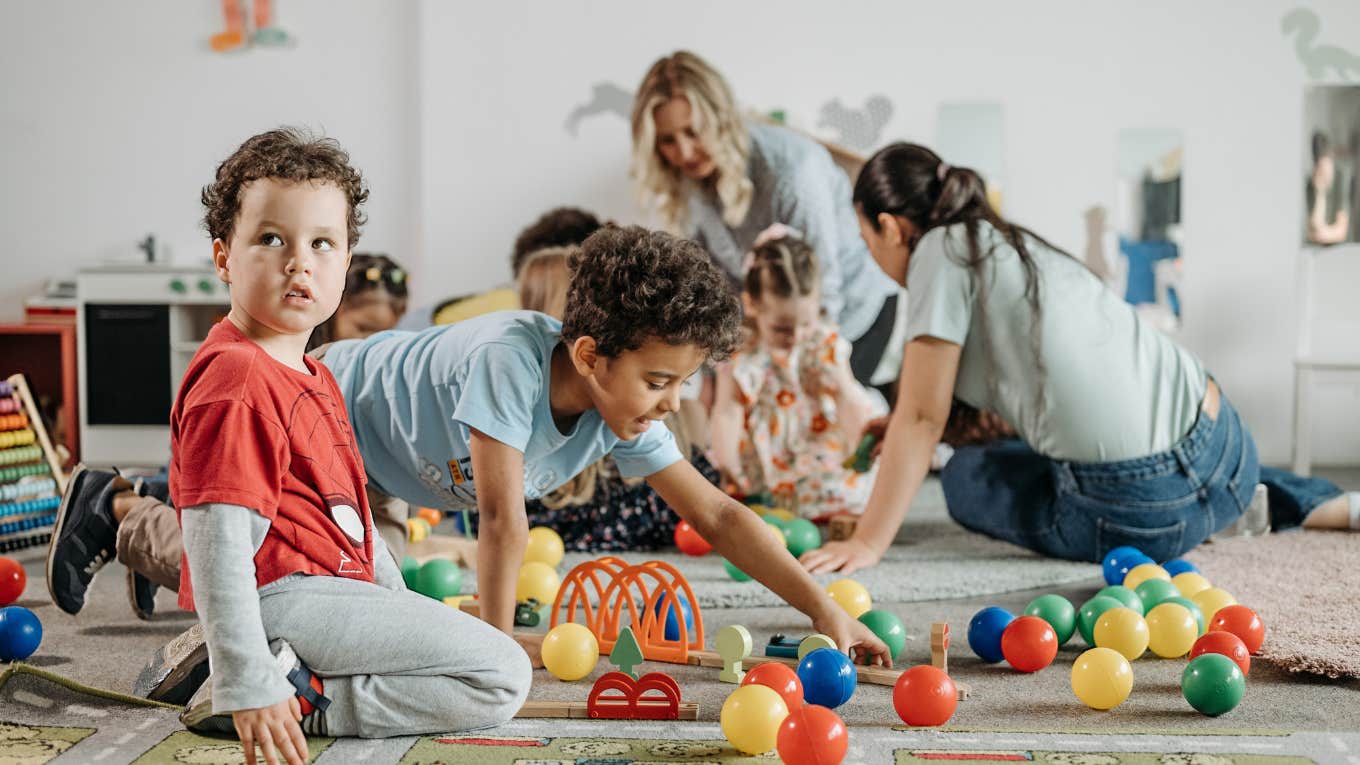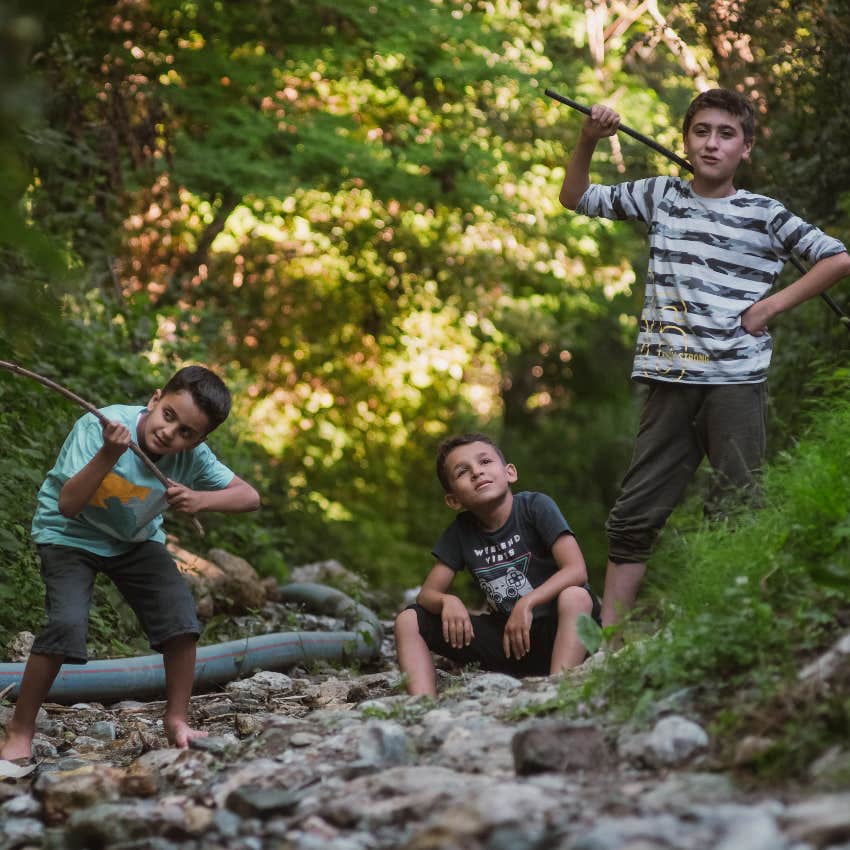Mom Worries That Her Son's Play Behaviors Are An Example Of Toxic Masculinity
Parents can use this behavior as an opportunity to educate children about real-life consequences.
 Pavel Danilyuk from Pexels / Canva Pro
Pavel Danilyuk from Pexels / Canva Pro “Play” is meant to be fun. By definition, that’s what we all think of when we think about having a good time. When trying to understand what kind of play behaviors are healthy for children, it’s important to remember that simple definition.
As long as children are having fun, there’s rarely a need to put boundaries on “pretend play.” But one mom is worried that her son's fun is a sign of toxic masculinity.
This mom is worried her son’s ‘good versus bad’ play activities are reinforcing unhealthy gender stereotypes.
A worried mom reached out to Slate’s parenting podcast “Mom and Dad Are Fighting” for advice on whether or not she should be intervening after watching her son's preferred play. “How have parents dealt with children’s shifting interests and behaviors when they start showing a preference for certain activities and play dynamics that might reinforce traditional gender roles and exclusionary behavior?” one of the hosts asked.
Responses to advice for this parent were multifaceted but overall positive. And they're right.
According to clinical psychologist Michael Thompson, if children are having fun and nobody is frightened, hurt, or uncomfortable, there’s no reason to consider it as “violent” play. In fact, this type of play could actually be beneficial to their growth and development in the long run.
Parenting Coach BrookeLynne Dukes explained on TikTok that the behaviors of “bad guys” are often deemed as unacceptable or looked down upon which makes kids even more curious.
“[Good versus bad guy behavior] does not mean we allow punching, hitting, or other unsafe behavior, but that helps to understand the fascinating behavior for our kids.” Because children want to understand these behaviors and explore them in a safe way, the tendency for “good versus bad guy” play behaviors in children is extremely common.
Studies show that ‘good guy versus bad guy’ play is a natural part of children’s social, moral, and emotional growth.
For many parents, including the mom who wrote into this podcast for support, witnessing these behaviors can be unsettling, especially for kids who are just starting to make more interpersonal connections at school.
 Photo: Muhammed Aktürk from Pexels / Canva Pro
Photo: Muhammed Aktürk from Pexels / Canva Pro
However shocking and uncomfortable seeing your child play “the bad guy” on the playground might be, there’s no reason to be concerned. In fact, the “good guy versus bad guy” play behavior is more likely to help children explore what it means to be powerful.
Oftentimes for “rule-following children,” according to psychologists and parent experts like Jane Katch, that means it can be fun to pretend to be the bad guy, and they’ll often benefit from doing it.
Many parenting creators discussed the unhealthy play behaviors of children, and how parents can combat them.
Creators like Ryan Allen of @preschooltherapy talk about the idea of “rough play,” or wrestling or playing physically, whether that be playing within your family or interpersonally between other kids. While in many ways this physical play can be beneficial for children, there’s a very important conversation about how parents should be moderating it.
“It can teach kids boundaries and consent,” Allen said. “For example, you’re wrestling around and maybe they go too far, and then you time-out and say ‘let’s take a break’... as long as everyone is respecting boundaries and having fun, it’s healthy.”
This conversation about consent and boundaries can inform the way that our children not only play with their friends on the playground, but how they treat other people in their life like their siblings, teachers, and parents.
An important piece of this conversation is making sure you understand when your child is upset or uncomfortable. Those situations should not be deemed as play but rather an unhealthy behavior that should be addressed.
Experimenting with these play behaviors doesn’t equate with ‘toxic masculinity,’ but it can promote empathy in children.
Unstructured playtime for children to explore different behaviors is essential to growth, including their development of social skills, empathy, and kindness. Allowing children to “pretend to be someone else” when they play can actually give them a more well-rounded picture of the emotions, feelings, and experiences of others. This helps them to develop empathy.
 Photo: Robert Kneschke / Canva Pro
Photo: Robert Kneschke / Canva Pro
Studies show that in addition to playing “dress-up” or “good guy versus bad guy,” allowing children to play with toys like stuffed animals can be a great way to promote empathy.
Creating backstories, understanding why people might say a certain thing or choose to be a “bad guy,” or experimenting with clothes can all help children to have a more positive attitude about themselves and the people around them.
Of course, as a parent, you can choose where to set boundaries with your children. If the idea of your child being a “bad guy” with a pretend sword is uncomfortable, then you can set that boundary.
However, instead of clinging to the idea that the play behavior is bad, using it as an opportunity to educate children about real-life consequences can be a great way to start shifting their perspective on the character they’re pretending to be.
Zayda Slabbekoorn is a news and entertainment writer at YourTango focusing on pop culture analysis and human interest stories.
